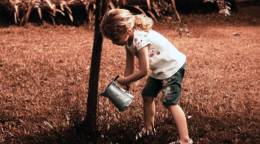“A PhD really tests you in terms of your work habits and your mental health” – A PhD candidate shares her experience

Do you want to know what happens behind the scenes during PhD? Meet Anastasia Shavrova, a PhD candidate at University of New South Wales, Australia, who shares the challenges and high points she's experienced in her PhD journey. Read on!
Anastasia Shavrova is a researcher and science communicator. She is a PhD candidate at University of New South Wales, Australia, researching reproductive evolution and conflict. She specializes in the evolution of animal behaviour. She also runs the podcasts Boiling Point and Convos with Chordates, which cover different aspects of academic life. She has also been invited to present her research in different ways from stand-up comedy to live television.
A little about me and my project
I am in the last stage of my PhD, handed in and awaiting assessor comments before I can be confirmed as a doctor. I am an evolutionary biologist. My project is looking at differences between males and females and how their behaviours, appearances, and genomes can harm one another, specifically in animals, but much of my work that be extrapolated to humans. Natural selection is survival of the fittest, but sexual selection is survival of the “sexiest.” It is often the case that one sex is trying to impress the other, think male birds that sing for females to impress them with their vocal abilities. But not all animals are this compromising and collaborative. Instead of impressing their mates, some animals can evolve harmful behaviours. For example, animals across the animal kingdom can manipulate, cheat, or use force to get mates. So, I look at what happens to their mates if they are pressured into these situations. Additionally, these harmful behaviours and traits can be made even more complicated when animals evolve weapons (i.e. rhino horns, elephant tusks, deer antlers). So, I further explore whether they use these weapons against their mates, or against their same-sex competitors.
My life as a PhD student
Life as a PhD student is very variable and days can really differ from one another. When I first started my PhD I did field work, lab work, and some writing. As I moved closer to the end of my PhD, my workdays became very writing and statistics heavy. Every student has a different PhD experience because it depends on their working style and on your animal/project that you study.
What I enjoy the most about my PhD
The best part of my PhD is that not only did I get to fully explore the research topic I have been curious about (evolution of sexual traits), but also spread the word about how cool my research is! I got many opportunities owing to my PhD like performing science-inspired stand-up comedy at the Sydney and Brisbane comedy festivals, performing at Splendour in the Grass, a Sydney music festival, meet, chat, and perform with Dr. Karl, the “Bill Nye the Science Guy” of Australia, and so much more!
The most challenging aspect of pursuing a PhD
The thing about doing a PhD is you are your own boss. You learn how to manage your own time, keep yourself accountable, and stay on top of your work. Additionally, a PhD can be tough at times. A PhD really tests you in terms of your work habits and your mental health. So, it is important to be passionate about your work which really helps keep you going and striving for the finish line.
How one can make the most out of their PhD experience
Throughout my PhD I tried everything to see what I would like. I would sign up for conferences, meet and network with people that I found interesting, and start my own projects outside of research such as podcasting and blogging. I would also try volunteering to help my friends and colleagues with their lab or field work to learn about other research projects. A PhD can offer a variety of opportunities. You just must know where to look and to take the opportunities that come your way, and the best way to do that is to just ask and talk to people; let them know you are interested in trying new things.
My advice to female students aspiring to do a PhD
While I have mostly had positive experiences as a woman in science, some dodgy interactions and emotionally draining incidences do occur. My advice for women aspiring to do a PhD is don’t ever forget you deserve to be here; you are brilliant, and stand up for yourself!
Comments
You're looking to give wings to your academic career and publication journey. We like that!
Why don't we give you complete access! Create a free account and get unlimited access to all resources & a vibrant researcher community.











